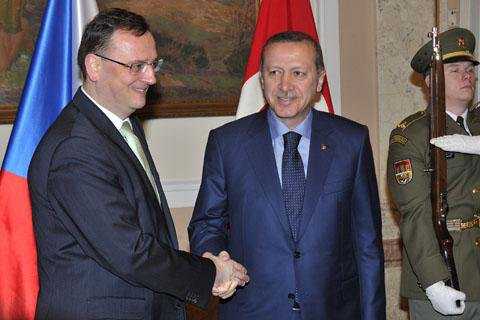The two countries’ prime ministers focus on trade links at bilateral summit
Walter Novak

Nečas says there is scope for growth in trade between Turkey and the Czech Republic.
By Markéta Hulpachová and Daniel Bardsley
Staff Writers
The growing energy sector in Turkey offers major opportunities for Czech companies, the Turkish prime minister, Recep Tayyip Erdoğan, has indicated on a visit to Prague.
As the Czech utility ČEZ continues its heavy involvement in Turkey, Erdoğan said there would be scope for more Czech firms, with work such as cleaning up power plants and providing generators likely to figure highly.
Erdoğan even suggested there might be chances in the nuclear industry as Turkey presses ahead with its plan for three plants.
Making his comments Feb. 4 after talks with Czech Prime Minister Petr Nečas, the Turkish prime minister said he wanted bilateral trade, currently around $2.65 billion a year, to nearly double to $5 billion in the coming years.
“The Czech Republic is skilled in energy infrastructure, has a lot of know-how and experience, and Turkey expects advancement, especially in hydro, coal [and] gas power plants,” Erdoğan said at a press conference alongside Nečas.
There was, he said, “room for cooperation” in work to reduce emissions at the country’s coal- and gas-fired power plants, adding the two countries should “take steps” together in nuclear energy.
“Now, a third nuclear plant is planned, and there is a possibility this will be a part of our strengthened mutual cooperation and contribute to raising the current [trade volume] numbers,” he said, referring to Turkey’s plan for its third nuclear power station – its first is not due to begin power generation until 2020 – to be built at Iğneada on the Black Sea coast.
ČEZ has for several years had major investments in Turkey, notably holding a stake in Akenerji, a major power-generation company, whose projects have included the building of the Egemer-Erzin gas-fired power plant, due to begin operations late next year. Škoda Power, based in Plzeň, has also secured large contracts in the power-generation sector, while other Czech players in Turkey include engineering companies Vítkovice and ČKD.
There could be opportunities for smaller Czech companies to win contracts, suggested Petr Bartek, an energy analyst at Erste Group Bank A in Prague.
“There’s a long-term experience in small Czech companies with construction of pipes and power plants and such things, so in Turkey there’s the outlook that there will be more installed capacity needed, and our companies are offering to bring the expertise,” he said.
“It’s not only about ČEZ, which is investing money there. It’s mainly about the small and midsize companies in the energy sector. This whole industry is quite well developed in the Czech Republic, and we have the know-how, and Turkey is a market that is expected to grow pretty fast in energy.”
Fueled by economic development in the country of 76 million, Turkey’s total electricity consumption could reach as much as 368 terawatt hours (TWh) in 2020, compared with 159.4 TWh in 2008.
Linked to Erdoğan’s visit, media reported that the Czech Republic and Turkey had finalized a memorandum of strategic energy partnership.
Nečas said there was scope for further significant growth in bilateral trade on the back of heavy increases in recent years.
“In the past 10 years, mutual trade has increased sevenfold, but we shouldn’t be happy with that as there is enormous potential for further development,” he said.
While Czech companies have been active in Turkey, especially in the energy sector, the presence of Turkish firms in the Czech Republic has been limited.
Indeed, Václav Hubinger, the Czech ambassador to Turkey, told media during a recent interview “the Turkish presence in the Czech market is almost zero.”
Erdoğan’s visit could help to change that, since the agenda also featured a business forum that included Czech companies and Turkish businesses. Significantly, the Turkish prime minister was accompanied by representatives of about 100 Turkish companies.
After talks between the two prime ministers, Nečas said he supported allowing Turkey entry into the European Union, while Erdoğan told media that membership for his country would improve the standing of the EU.
“The European Union should get strength from Turkey if it wants to be a global economic and political power. Today, the EU needs Turkey, not the other way around,” Erdoğan said.
While saying Turkey’s possible joining of the Shanghai Cooperation Organization – a possibility some commentators have not taken seriously – did not preclude the country joining the EU, he criticized the 27-member European bloc for failing to grant Turkey membership so far.
The EU also came in for criticism over what Erdoğan indicated were inadequate efforts to aid Turkey’s efforts to combat terrorism. “We cannot seem to receive the necessary support from Europe,” he said in comments reported by the Turkish-based Hürriyet Daily News.
“Even when we alert the authorities on suspects and provide evidence of their terrorist acts, we don’t receive attention. They tell us they are following those suspects.”
The writers can be reached at business@praguepost.com
via Czech firms turn toward Turkey – Business – The Prague Post.